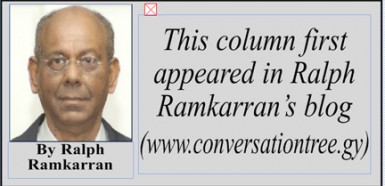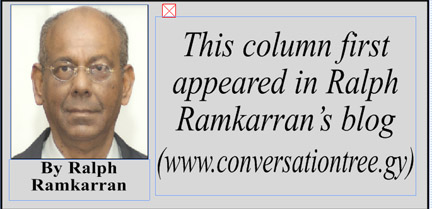Since the restoration of free and fair elections in Guyana, the only election results that have been accepted were those of 1992, even though they, and most other elections since then, were accompanied by violence, particularly after the elections. The opposition castigated the 2011 elections alleging ‘discrepancies,’ although admitting that the results would not have been affected. The PPP went further and alleged that the 2011 elections were rigged against it.
The consequences of the failure to accept election results have been devastating to Guyana. It results, after most elections, in serious post-election violence, which causes damage to property, injury and loss to innocent people and harm to Guyana.
It further exacerbates ethnic tension, which the elections campaign would already have whipped up, drives fear in the population and generates a feeling of uncertainty in the minds of investors.
 In the recent elections in Nigeria, opposition candidate Muhamadu Buhari, 72, a former military dictator, scored an upset victory by defeating the incumbent, Jonathan Goodluck, who conceded defeat and congratulated Buhari even before the counting of the votes had concluded when it became clear that he had lost. This had never been done.
In the recent elections in Nigeria, opposition candidate Muhamadu Buhari, 72, a former military dictator, scored an upset victory by defeating the incumbent, Jonathan Goodluck, who conceded defeat and congratulated Buhari even before the counting of the votes had concluded when it became clear that he had lost. This had never been done.
Writing in his April 3 column ‘A changing tide in Nigeria’s fortunes,’ Sir Ronald Sanders said: “The ritual of conceding defeat with a telephone call is fairly normal in most countries, but it is so unique an event in Nigeria that several respected Nigerian figures… lauded President Goodluck for doing the right thing… it was the first time in the country’s history that a loser called his opponent to admit defeat in a presidential poll. By conceding defeat in the manner that he did, Jonathan spared Nigeria widespread violence and unrest that many observers feared might be a consequence of the elections. Had that unrest occurred it would have further set back Nigeria’s economy, which has been reeling from the falling prices of oil, the main money earner for its economy.”
Even though Guyana’s return to democracy was five years earlier in time than Nigeria’s, no such telephone call has ever been made despite the fact all elections since 1992 have been declared to be free and fair by credible local and international observers.
With the history of free and fair elections in Guyana, it is surprising that there appears to be a consensus that Guyana needs foreign observers. It may well be that there is an sub-conscious feeling that Guyana’s ethnic politics needs an mediatory nursemaid to guide it over the elections so as to at least assist in dampening the violent prone responses to the results.
Already for months Gecom has been under sustained, weekly assault by the PPP, which must have had negative consequences on its credibility, even though Gecom is doing a highly credible job. Friendly diplomatic missions in Guyana which assist in funding our elections have pointedly and rightly so, expressed confidence in Gecom.
Now, to pour opposition gasoline on the PPP fire, broadly speaking, the opposition is alleging that the voters’ list is ‘dirty.’ This accusation is deeply emotive. It is of long memory and ignoble history since 1968. I said ‘broadly speaking’ because, believe it or not, the PPP which has been accusing and demanding of Gecom over issues relating to the whole gamut of the elections process, has surprisingly rejected the opposition’s accusation of a ‘dirty’ list.
Dr Steve Surujbally, the Chairman of Gecom, has explained why the list of 570,708 is approximately 76 per cent of the estimated population of 750,000. It is because there is no legal mechanism to delete from the list the names of persons who have migrated. These persons do not report to anyone when they are leaving and there is no way to discover who the emigrants are.
The elaborate legal and administrative mechanism, including stakeholder participation, to ensure the validity and accuracy of registrants ensures that every person on the list is lawfully entitled to be there. If some of these lawful registrants have migrated, they cannot be deemed to be ‘dirty.’ They have to remain on the list until they are removed in the process of a new house-to-house registration.
In any event, the voters’ list is only one feature of free and fair elections. The staining of fingers after voting, counting at the place of poll, the placement of polling agents by both major political parties at most polling stations, the requirement for the signature of polling agents on the statements of poll, the public display of the statements of poll immediately after the count and more, all add up to ensuring free and fair elections.
Foreign observers have pronounced on elections on five occasions from 1992. Since Guyana still appears to need observers and the latter seem willing to assist, they should take their game to a higher level on this and future occasions. They cannot properly insist that the losers accept the results as this would be seen as interference. But they can negotiate that as a condition of accepting the invitation to observe, they would ask that the results be accepted by the political parties if they are deemed to be free and fair. Observer missions with clout such as the Carter Center and the Commonwealth should take the lead in this persuasive effort.






